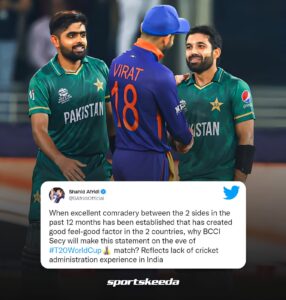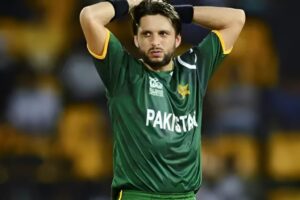
Pakistan Champions captain Shahid Afridi urged for a clear separation between cricket and politics after the scheduled World Championship of Legends match against India Champions was cancelled
The cancellation of the highly anticipated India vs Pakistan clash in the World Championship of Legends (WCL) reignited the long-standing debate over the intersection of sports and politics. The match, scheduled to be held in Birmingham on Sunday, was called off after several Indian players, including Shikhar Dhawan, Yuvraj Singh, and the Pathan brothers, pulled out, citing their unwillingness to play against Pakistan. Shikhar Dhawan, a key member of the India Champions squad, had publicly taken a strong stance against the fixture months ago and reaffirmed his decision just a day before the match.
In the aftermath of the cancellation, Pakistan Champions’ captain Shahid Afridiaddressed the media and emphasized that cricket should be kept separate from political tensions. “We are here to play cricket, and I’ve always maintained that cricket should move forward independent of politics,” Afridi said. “A cricketer should represent their country with dignity, not bring embarrassment.”
Afridi, however, faced criticism for his remarks due to his own history of making politically charged statements in the past. His recent appeal for keeping cricket free of political influence was seen by many as contradictory. Despite that, he remained firm on his view that the game should not be hindered by political disagreements.
Shahid Afridi Slams Indian Players Over Last-Minute Withdrawal, Calls for Politics-Free Cricket.

Frustrated with how the situation unfolded, Shahid Afridi criticized the Indian players for backing out at the last moment. “If India didn’t want to play against Pakistan, they should have said so earlier. Why come all the way, attend training sessions, and then pull out a day before the match?” he asked. “That’s not how professionals behave. It sends the wrong message.”
Shahid Afridi further suggested that external pressure, particularly from social media outrage and political sentiments back home, played a major role in the Indian players’ withdrawal. “Had there not been a backlash online, this match would’ve gone ahead as planned,” he noted.
In what seemed to be a veiled jab at Shikhar Dhawan, Shahid Afridi hinted that a single individual had derailed the entire match. “Sometimes, all it takes is one rotten egg to spoil everything for everyone,” he said. “Sports should bring people together. But if we let politics interfere every time, how will we ever move forward? We need dialogue, not distance.”
Afridi also tried to downplay his own significance in the grander scheme of things. “If I had known the match was being cancelled because of me, I wouldn’t have even gone to the ground. What is Shahid Afridi in front of cricket? Nothing,” he stated. “Cricket is bigger than any individual. If someone doesn’t want to play, they can sit out. But the game should continue.”
His comments added fuel to an already heated conversation on social media, with fans and commentators divided over whether politics should influence international sporting events, especially those involving India and Pakistan. The incident has once again underscored the fragile relationship between the two nations, even on neutral grounds.
Shikhar Dhawan Breaks Silence on Refusing to Play Against Pakistan.

On Saturday, just a day before the scheduled India vs Pakistan clash in the World Championship of Legends, Shikhar Dhawan reaffirmed his decision to not participate in the match. Taking to social media, he wrote, “Jo kadam 11 May ko liya, uspe aaj bhi waise hi khada hoon. Mera desh mere liye sab kuch hai, aur desh se badhkar aur kuch nahi hota.” (The decision I took on May 11, I still stand by it. My country is everything to me, and nothing is greater than the nation).
Dhawan’s strong nationalistic stance was not isolated. Other prominent Indian cricketers, including Yuvraj Singh, Suresh Raina, and the Pathan brothers (Irfan and Yusuf), also chose to opt out of the match against Pakistan. Their collective refusal to play sent a strong message and left the tournament organisers with no option but to cancel the much-anticipated fixture.
The mass withdrawal by Indian players has reignited the ongoing debate over the relationship between sports and politics. While the Indian contingent maintained that national sentiment should come first, others questioned whether politics should interfere with international sporting events. Regardless, the unified decision from the Indian players made it clear where their priorities lie.
